Stretching Exercises
Stretching
Stretching is the perfect start or end to all workouts and exercises. The muscles are warm and will be able to lengthen and stretch from being warmed up. Stretching after a workout will help you not feel sore the next day and will allow the flow of energy move throughout the body. Remember, my complete Home Workout Program is a blueprint guide from beginning to end, a home workout that you can do from home.
This video will show you various stretching techniques and exercises.
One Leg Out Stretch
To start the stretching part of the Home Workout, you want to have your legs out and in front of you and together. Place your hands on the knees and sit with your back straight. Bring one leg in to the thigh and stretch forward to the extended leg. As always, breathe through nose and out through your mouth. If you can't reach your foot go as far as you can, even if its to your knees or your shin. Hold this stretch for 10 breaths. Now we're going to slowly release that stretch. You now want to bring the other leg back up in front, hands on the knees, give the feet a little wiggle and bring the other foot in. Sitting up nice and tall and stretching forward. Take 10 more deep breathes in and our keeping your body relaxed. Now we're going to extend one hand down the center line, keep one hand on the leg and this is going to help stretch the groin as well as the extended leg. Take 10 deep long breathes. Do this again. One leg is extended and one foot is in against the knee. Reach down the center and keep your back straight.
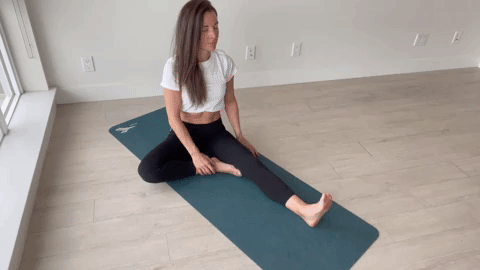
One Leg Out Stretch
- One leg is extended in front, the other bent and inward.
- Reach down the extended leg.
- Hold this position for 10 deep breaths.
Seated Side Splits
The next stretch I'm going to teach you is the seated side splits. Bring your legs spread apart in a seated position. Taking a moment and stretch forward. Hold this stretch for 10 deep breaths.
Breathing is a very, very important part of stretching. It helps keep the energy flowing through your body and keeps you relaxed and helps your body to feel comfortable and breathing.
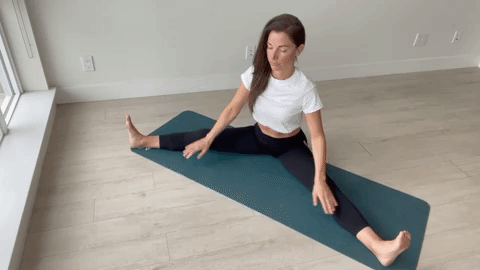
Seated Side Splits
- Open legs as far as they can go.
- Place hands down the centerline.
- Reach as far as you can, holding for 10 breaths.
Arm Over Shoulder
The next stretch I'm going to show you is the seated side split reach over technique. You should place the left hand around the stomach and reach over our shoulder and grab the toe if you can. Take 10 deep slow breaths. The other variation is placing the hand on the ground and using it as resistance to push yourself further into the stretch.
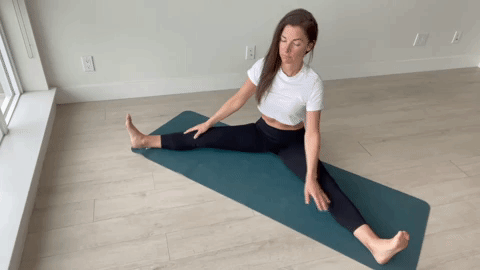
Arm Over Shoulder
- Place legs open as far as they can go.
- Reach over one shoulder and try to touch your toe.
- Hold this position for 10 breaths.
Static Lunge
The final stretch I'm going to show you is the stationary or static lunge. You want to make sure that you have your knee in line with your heel but nowhere past- you don't want it like this and you definitely don't want it over too much so you want to just get into a comfortable position.
And if by chance you need something to support your back knee such as a pillow, yoga mat or anything else that is comfortable, please use that. Comfort is everything in the home workout. Remember to always make sure you are breathing slowly. Take 10 deep breaths.
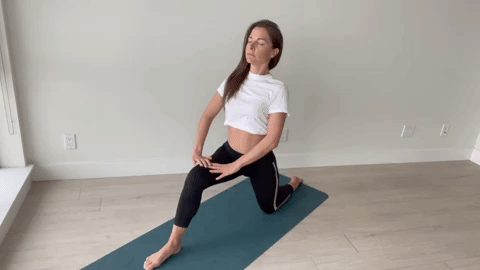
Static Lunge
- Place leg out in front bent with knee in line with ankle.
- Extend back leg out.
- Stretch back leg and hold for 10 deep breaths.
Morning and Before Bed Stretching
It's important to give yourself tender loving care at the end of the day as well as energy flow in the morning with stretching. Stretching not only relaxes you, but it also keeps your muscles flexible so you're less likely to experience discomfort during daily activities. Stretching first thing in the morning can relieve any tension or pain from sleeping the night before. It also helps increase your blood flow and prepares your body for the day ahead. Stretching before bed relaxes your muscles and helps prevent you from waking up with more pain and stretching before bed can greatly impact the quality of sleep you have at night. It allows you to release some of the tension you've built up during the day so you can prepare both your body and mind for a good night's sleep.
Morning Stretches:
Child's Pose
This restorative pose is great for gently stretching out your hips, pelvis, thighs, and spine, all of which can be a bit tight in the morning. It can feel really great if you've slept a little "wrong" or twisted up. It also calms the brain and relieves stress and fatigue, so it can be helpful for starting the day off on the right foot. Muscles worked: This lengthens your gluteus maximus, piriformis, other rotators, hamstrings, spinal extensors, and more.
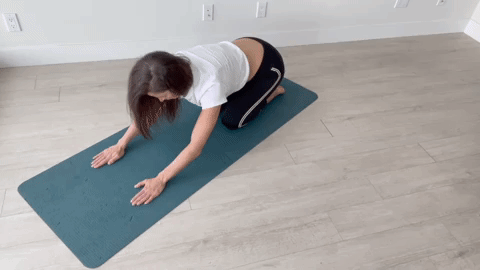
Morning Shoulder Stretches
Keep your rotator cuff and shoulders healthy with the overhead shoulder stretch. Here's how: Stand nice and tall and lace your fingers together. Raise your hands above your head, palms upward. Lift up stretching your rib cage. Hold for a count of 10. Repeat 5 more times. Be sure to watch for any pinching or painful sensations in your shoulders as you do this. If you feel shoulder pain while stretching, stop the exercise immediately.
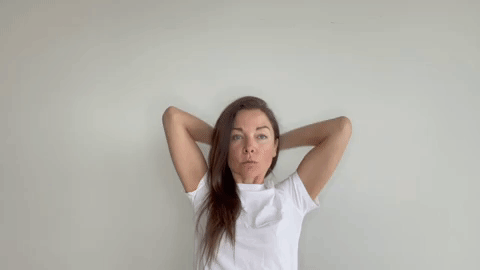
Standing Quad Stretch
To stretch your quadriceps muscles in the front of your thighs: Stand up and hold onto something stable. Bend one knee up and grab your ankle with one hand. Hold your leg up for 15 seconds. Repeat 3 times. Now you should be all stretched out and ready to start your day.
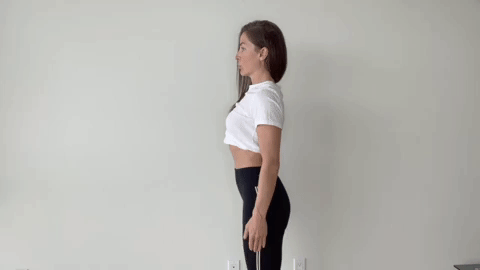
Bedtime Stretches:
Bear Hug
To explain the bear hug, start by standing tall and inhale as you open your arms out wide. Exhale as you cross your arms, placing your right arm over your left and your left over your right to give yourself a hug. Breathe deeply as you use your hands to draw your shoulders forward. Hold this stretch for 60 seconds. To release, inhale to open your arms back open wide. Exhale and repeat with your left arm on top. This stretch helps to alleviate shoulder discomfort or pain caused by bad posture. This stretch works the rhomboids and trapezius muscles of your upper back and is easy to do before bed.
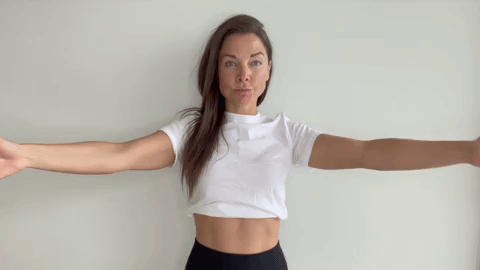
Child's Pose
Bring yourself down on your knees and sit comfortably on your heels. Bend at your hips to fold forward and rest your forehead on the floor reaching your arms in front of you. A pillow or cushion under your thighs or forehead for extra support might help make this stretch more comfortable. Breathe deeply in through your nose and out through your mouth while holding child's pose. If you can hold this pose for up to 5 minutes, you will be rewarded with wonderful energy flow right before bed. Child's pose is perfect for tuning into your breath, relaxing your body, and reducing stress. It also helps to relieve pain and tension in your back, shoulders, and neck.

Happy Baby
Just like a happy baby, lie on your back and lift legs while bending knees. Keep feet flexed towards the ceiling. Grab big toes of each foot with respective hand and continue to bend the knees towards the armpits. A more advanced and elaborate stretch can be reached by gently rocking left to right, gently massaging the spine. Hold for 60 seconds. Happy baby lengthens and realigns the spine, stretches the inner groin, and can help release your hip flexors. After a long day in the office, this stretch can be a lifesaver, helping to rid you of stress and get a good nights sleep.
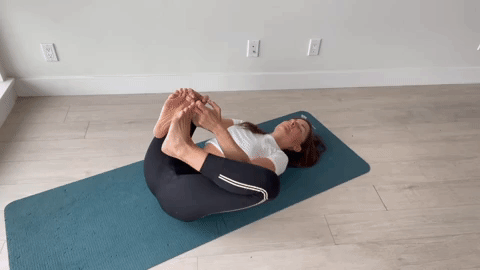
Corpse Pose
While you are laying on a yoga mat or in bed, place legs slightly apart and stretched out in front of you, arms long by your sides with palms up. Close your eyes and bring focus to your breathing, in through your nose and out through your mouth. Hold for 60 seconds or until you fall asleep. The best way to end the day is to let go of everything you're holding onto including stress, thoughts about tomorrow, and other things that may be on your mind. By focusing the mind on stillness and bringing awareness to the breath, the body begins to naturally relax, preparing you for a great night's rest.
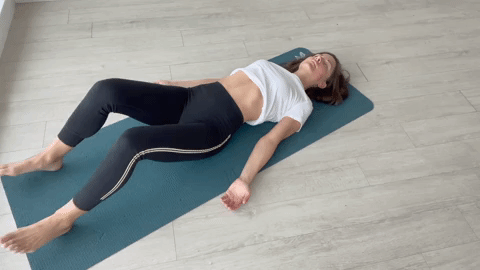
Benefits of Stretching
"Flexibility Creates Physical Freedom in the Body" - Kung fu Kendra.
Stretching helps keep muscles flexible, strong, and healthy. Flexibility through stretching helps to maintain a range of motion around the joints that helps us live our lives easier. Without stretching, muscles become shorter and therefore become tight and we are less able to move our bodies comfortably. Stretching can help you feel longer and stronger and more confident as you go about your life. Stretching allows the flow of energy to flow through your body removing blockages and neutralizing negative energy. When combined with breathing, stretching can become a meditative activity, allowing you to fully be inside yourself - without outside distractions. Stretching helps with upper and lower back pain, and has been used to help treat back issues as a physical therapy.
Static Stretching
Stationary stretching, or static stretching is the most commonly known type of stretch. It involves no dynamic movement. All stretches should be held in position for at least 60 seconds to get the full benefit of that stretch and effect on that muscle group. Some examples of static stretching are explained above, however there are a multitude of static stretches that a person can learn to do. While static stretching can increase the flexibility of your muscle tissue, it's better to do long static stretches after a workout (as opposed to before) when your body and muscles are warm and malleable. Due to this and as explained in the blog, static stretching is most effective after training sessions and workouts.
Dynamic Stretching
Unlike the static stretches learned above, dynamic stretches use dynamic or active movements where your muscles and joints move in full range of motion. Dynamic stretches help warm-up and cool-down your body before and after exercising and can be functional while replicating the movement of the activity or exercises you're about do. Experts typically recommend dynamic stretches before a workout versus stationary stretching. That's because pre-workout dynamic stretches are a way of moving slow before you move fast. Through dynamic stretching, you're preparing the body to work efficiently in order to both produce and absorb high forces. After a workout, dynamic stretching is important because your muscles are warm and they are ready to begin to release all of the chemicals and toxins that are flowing throughout your body. Having worked your muscles, stretching helps release tension, negative energy and chemical toxins. It's important to remember that stretching is something that a lot of times, people will overlook.
Stretching will help you feel good, tomorrow, it will help you feel good now and it will make you feel good for days after your workout and prepare you for the warmup when you do your next workout.